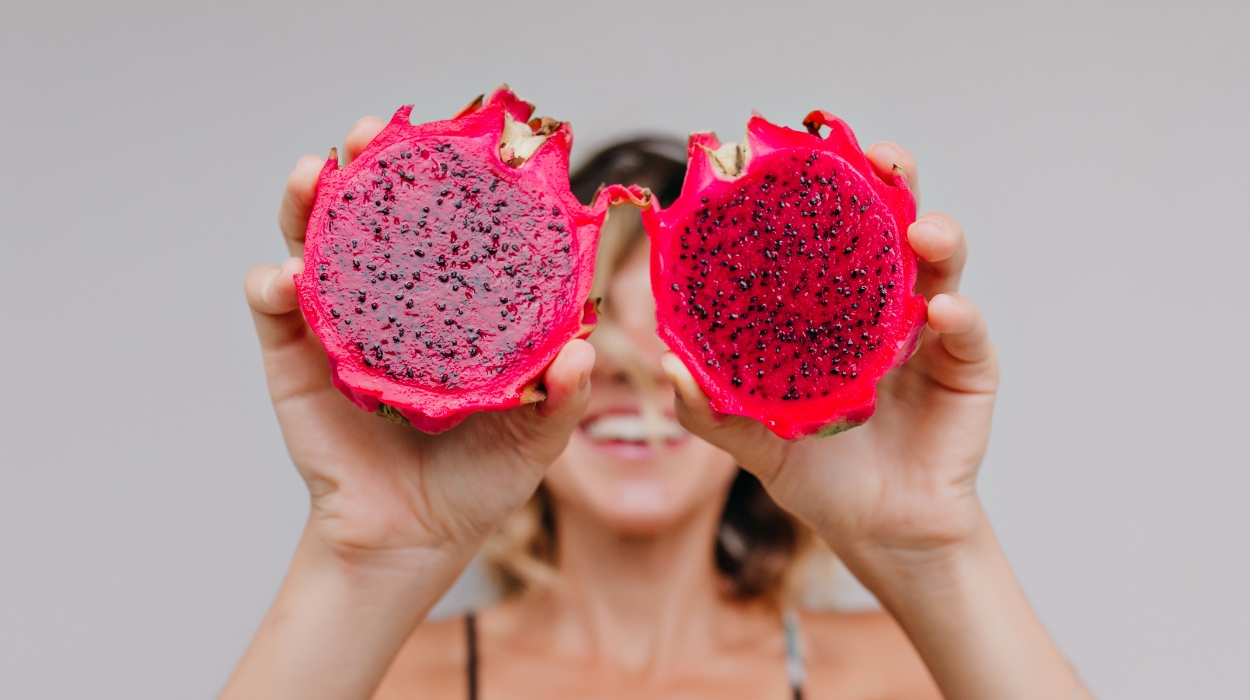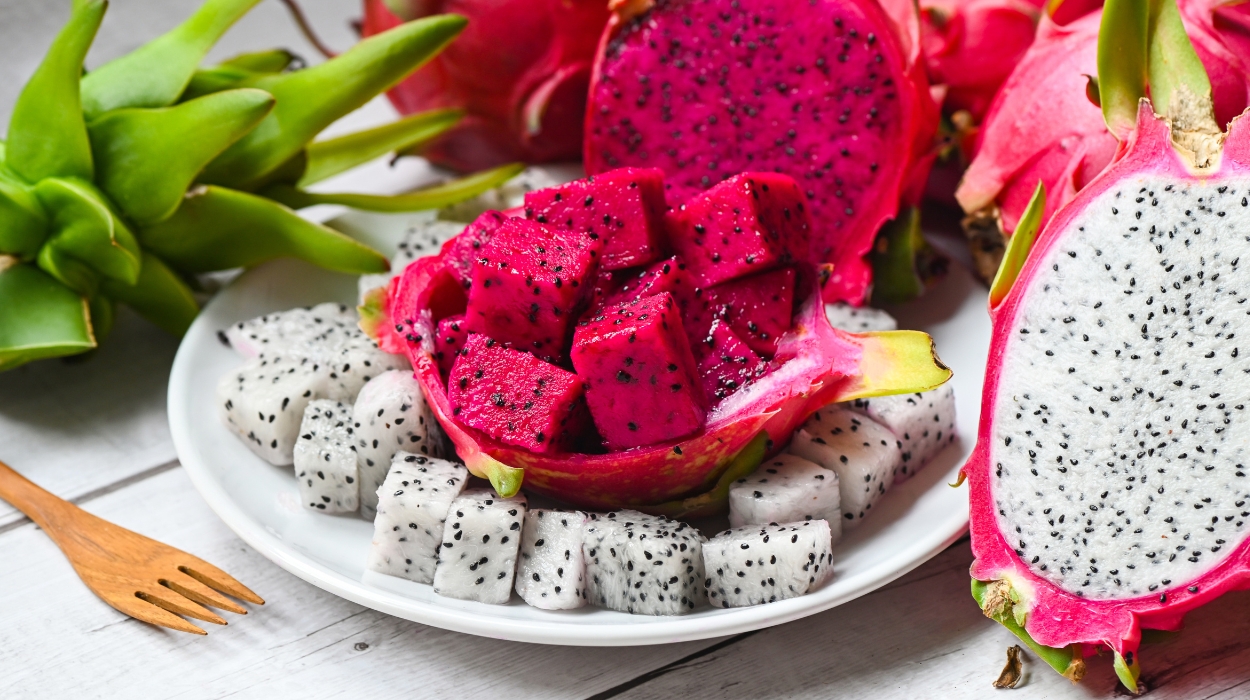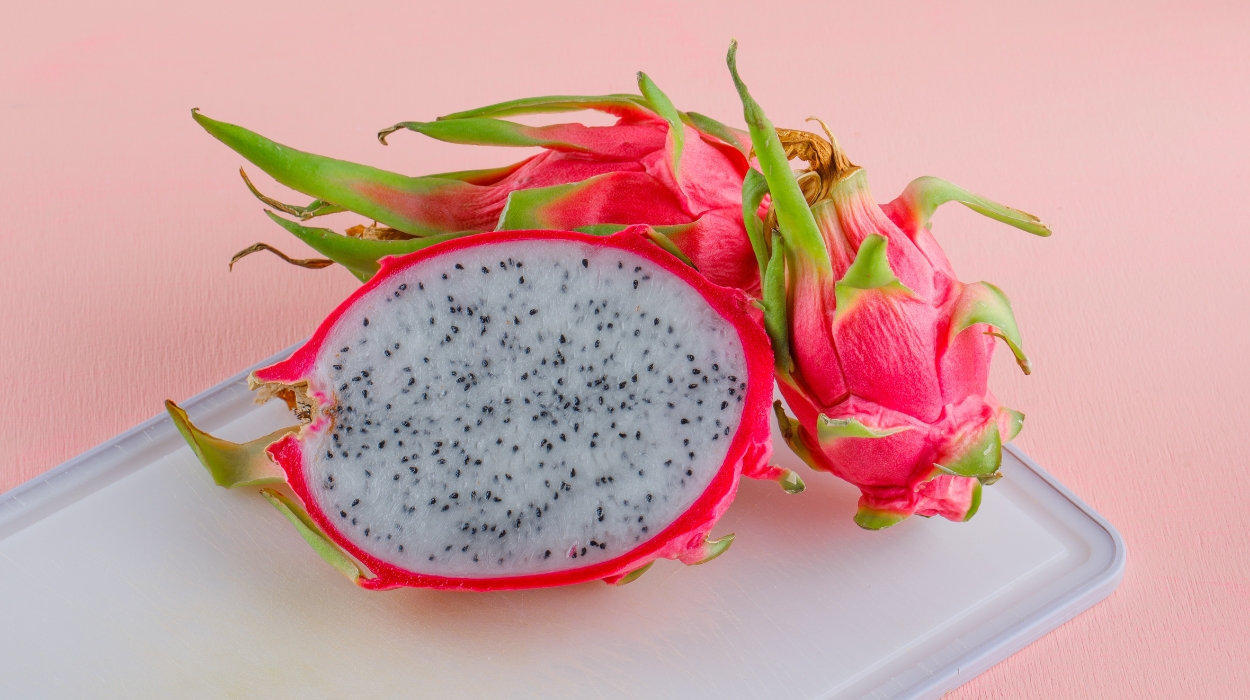Eating fruit is a smart choice when trying to manage a healthy diet. All fruit provides essential nutrients for optimal health. Experts recommend consuming various fruits[1] to obtain vitamins, minerals, and other bioactive compounds that offer health benefits.
A fantastic way to incorporate more fruit into your diet is by making smoothies. There are endless combinations of fruit and vegetables to mix into smoothies creating flavorful and nutritious meals. Smoothies are fabulous weight-loss meal options since they help with portion control.
Consuming fruit is necessary on a weight loss plan since it is low-calorie and nutrient-dense. Dragon fruit is a lesser-known but highly nutritious fruit containing beneficial bioactive components. You may wonder, is dragon fruit good for weight loss?
Research indicates nutritional components in dragon fruit are associated with anti-inflammatory and anti-diabetic properties[2] that promote health. Let’s dive further for details regarding possible weight loss benefits.
Does Dragon Fruit Help You Lose Weight?
Recent research reports dragon fruit provides many health benefits due to its nutritional components. It has antioxidant and anti-inflammatory qualities that protect against certain chronic health conditions and may provide support for obesity-related conditions.
Is Dragon Fruit Good For Weight Loss?

What Is Dragon Fruit?
Dragon fruit is a tropical fruit also known as pitaya, pitahaya, dragon pearl fruit, night-blooming cereus,[2] strawberry pear, and Cinderella plant. Dragon fruit belongs to the genus Hylocereus of the Cactaceae[3] family and is native to Central America and some parts of South America and South Asia.
Three types[2] of dragon fruit are widely grown and are characterized by their skin and flesh colors. Hylocereus undatus is the most commonly seen variety of dragon fruit.
- H. undatus possesses white flesh and red skin.
- H. polyrhizus has red skin and red flesh.
- H. megalanthus, or yellow dragon fruit, has pale yellow skin and white flesh.
Dragon Fruit And Weight Loss Research
Plants have phytochemicals that promote antioxidant activities which support cell repair and decrease inflammation. Research indicates that dragon fruit contains bioactive components that provide health benefits, such as improving obesity-related conditions.
Betacyanins[4] are red-colored pigments in red dragon fruit. They contain higher antioxidant levels than ascorbic acid, the biologically active form of vitamin C. Betacyanins are associated with potential positive effects on metabolic diseases.[5]
A 2016 research study looked at the effect of red dragon fruit betacyanins[5] on mice fed a high-fat diet. They found that mice fed red dragon fruit had reduced body weight gain and visceral fat, and improved fatty liver, fat cell regulation, and insulin resistance.
Another 2016 study reported white dragon fruit juice[6] reduced blood sugar levels, insulin resistance, and fatty liver in high-fat diet-fed mice. These conditions are common complications of obesity and may increase the risk of type 2 diabetes.
In vitro (test tube) studies using all parts of the dragon fruit demonstrated the peel contains anti-obesity properties. Red dragon fruit peel[4] prevented fat accumulation in cells and was associated with significant reductions in total cholesterol.
Does dragon fruit make you lose weight? Research indicates eating dragon fruit as part of a healthy, low-calorie diet can support your weight loss goals.
Benefits Of Dragon Fruit

Nutritional And Bioactive Content In Dragon Fruit
Dragon fruit provides significant nutritional content. A medium-sized fruit of approximately 75 grams[7] contains only 43 calories, which is a low-calorie content. It also has a high water content, making it a satisfying snack.
- Protein 0.27 grams.
- Fat 0.105 grams.
- Carbohydrates 11.4 grams.
- Fiber 2.32 grams.
- Sugar 7.31 grams.
Dragon fruit is a source of bioactive phytochemicals such as polyphenols, flavonoids, and vitamin C,[6] contributing to its antioxidant activity. It also contains potassium, magnesium, calcium, phosphorus, iron, and zinc.
Total phenolic content[8] and flavonoids are higher in the red-skinned, red-pulp dragon fruit H. polyrhizus. This gives it higher antioxidant potential than the red-skinned, white pulp H. undatus.
The main carbohydrates found in red and white flesh dragon fruit are glucose, fructose, and oligosaccharides.[2] These are a mix of short-chain fermentable carbohydrates that help feed the gut microbiome. Dragon fruit carbohydrates resist the digestive process in the stomach and form prebiotic fibers to benefit the good bacteria or intestinal flora.
Dragon fruit peel[9] contains a high fiber content that positively affects digestive health. The seeds of the dragon fruit[10] contain essential fatty acids. These seeds provide a high amount of unsaturated fatty acids, which protect heart health and have anti-diabetic qualities.
Red pulp dragon fruit has a medium glycemic index[11] or GI. White pulp dragon fruit has a low GI, which means it will not cause blood sugar spikes and provides blood sugar control. This is especially beneficial for people living with type 2 diabetes.
Health Benefits Of Dragon Fruit
As discussed earlier, dragon fruit’s bioactive components provide health benefits. Most notably, dragon fruit is associated with decreasing risk factors[2] for cardiovascular disease and metabolic health conditions. Studies show it helps lower cholesterol, blood pressure, and blood sugar.
Dragon fruit phytochemicals have anti-inflammatory and antioxidant properties and are protective against certain cancers. Research indicates dragon fruit extracts[12] positively affect prostate and colon cancer cells. The bioactive compounds in the extracts have cytotoxic effects[4] on cancer cells, meaning they may influence natural cell death.
Experts note that further study is necessary to determine dragon fruit usage for cancer treatment. Eating dragon fruit offers many other positive health benefits due to its noteworthy antioxidant qualities.
Ways To Eat Dragon Fruit To Lose Weight
Incorporating dragon fruit into your diet offers numerous health benefits. It has a low-calorie content and is fiber-rich. This makes it a great addition to your weight loss diet, but how can you eat this tasty fruit?
You can eat dragon fruit just like an apple or pear. Simply wash and eat it or scoop out the pulp and leave the skin. It can also be added to recipes to increase nutrients. Here are some options to incorporate the colorful dragon fruit for weight loss into your meals.
- Add dragon fruit to smoothies.
- Make dragon fruit juice.
- Mix it into fruit salads.
- Top a green salad with dragon fruit.
- Use it as a healthy dessert or a tasty snack.
- Make dragon fruit sorbet or ice cream.
- Add it to an açai bowl or on top of oatmeal for breakfast.
Other Helpful Tips For Weight Loss
Weight loss is a challenging undertaking requiring several components for success. Firstly, you must create a calorie deficit to lose weight, meaning you must consume fewer calories than you burn.
- Choose low-calorie, highly nutritious foods like fruits, vegetables, beans, and lean proteins to lose fat and keep muscle.
- Exercise regularly to achieve the recommended 150 minutes of moderate-intensity[13] physical activity per week to lose weight.
- Limit or avoid low-quality, high-calorie processed foods.
- Manage stress levels since prolonged elevated stress[14] can influence weight gain.
- Get enough sleep since lacking adequate amounts[15] can adversely affect your weight loss journey.
- Drink plenty of water for hydration and a sense of fullness.
- Consider using dietary supplements that support fat-burning and appetite suppression.
- Try nutritional supplements to help you get enough fruits and veggies or greens.
Conclusion
Research indicates eating dragon fruit provides health benefits and may support weight loss. Several studies address their antioxidant qualities as being instrumental in decreasing inflammation in the body. Inflammation is linked with several chronic conditions, such as cardiovascular disease, metabolic syndrome, and even cancer.
All fruit provides essential nutrients and contains phytochemicals. In a tasty package, dragon fruit contains phenolic compounds and other health-supporting, naturally occurring phytochemicals. It is a low-calorie food, which makes dragon fruit great for losing weight. Plus, its high fiber content supports overall digestion.
The colorful dragon fruit is a healthy sweet treat and a beautiful addition to any meal — so enjoy it!
Frequently Asked Questions
Dragon fruit provides anti-inflammatory bioactive compounds, is high in dietary fiber, supports digestion, and reduces blood sugar.
Yes, you may eat dragon fruit daily and enjoy its many nutritional benefits.
Each type of dragon fruit provides health benefits.
 Evidence Based
Evidence Based
